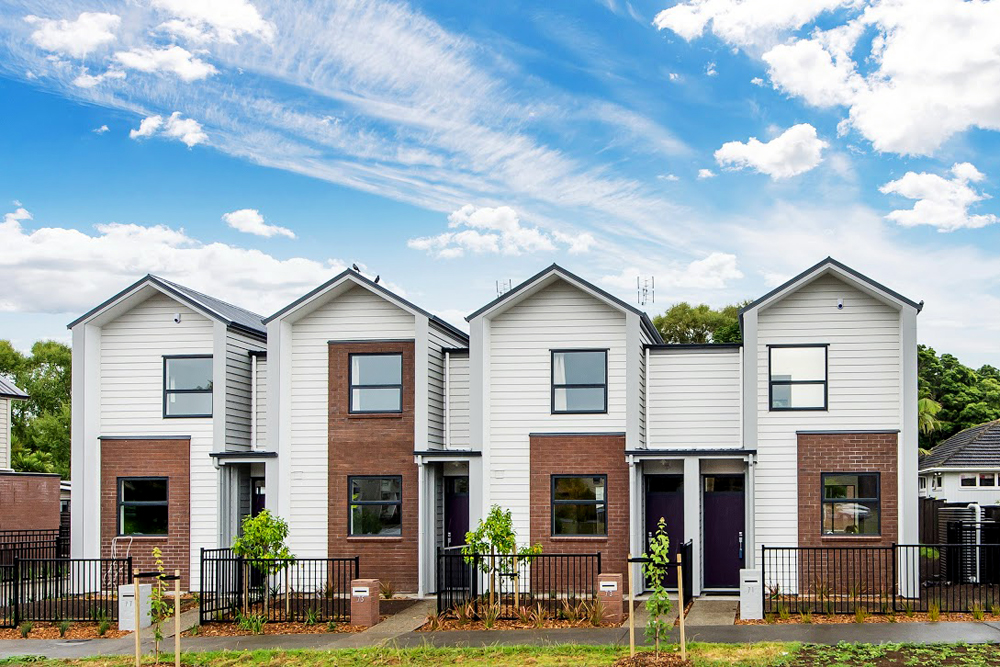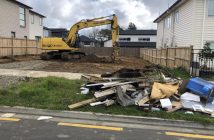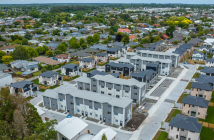A new bill has passed which is expected to deliver as many as 105,500 new houses in the next five to eight years by overruling district council plans

New building intensification rules will mean up to three homes of up to three storeys can be built on most sites without the need for a resource consent. Currently district plans typically only allow for one home of up to two storeys.
“New Zealand’s housing shortage is being made worse in our biggest cities by limits on the number and types of houses that can be built,” says Housing Minister Megan Woods.
“These changes will enable more homes that are attractive to first home buyers to be built in areas closer to their work, public transport and community facilities.”
Modelling on the medium density rules suggests they will result in 48,200 to 105,500 additional dwellings over the next 5-8 years, primarily in these areas:
- Auckland 27,900-53,700
- Hamilton 3,400-12,200
- Tauranga 3,800-8,500
- Wellington 6,500-14,000
- Christchurch 6,500-17,200
“There will be exemptions in the medium density rules in areas where intensification is inappropriate, such as where there is a high risk of natural hazards, or a site has heritage value,” adds Environment Minister David Parker.
In a rare moment of unity, both Labour and National worked together on the new bill.
“In April, I presented a draft Bill that would have required local authorities to zone more space for new housing, drastically cutting consent requirements for those wishing to build new dwellings whether through intensification or greenfields development,” says National Party Leader Judith Collins.
“My Bill was based on proven measures National took in Canterbury following the earthquakes which led to a surge in house-building.
“In June, Ministers Megan Woods and David Parker wrote to National confirming they saw merit in my proposal to increase the supply of residential housing. They welcomed National’s contribution to further development of policy to allow a serious uplift in new housing in urban areas.”
“National has long argued that land use restrictions and arcane planning rules have strangled new housing development,” says the party’s housing spokesperson, Nicola Willis.
“We have pressed for more permissive zoning rules to allow more dwellings to be built, both through intensification and greenfields development.
“This legislation takes power away from town planners and gives it back to the people they serve. It will allow our cities to develop and grow, with a range of housing types to suit people at different stages of life.”
But we have town planners for a reason and cutting them out of the process could be a mistake.
Act Party Leader David Seymour points out that the Auckland Unitary Plan has said for the last four years that 420,000 additional dwellings are theoretically possible but prices went up 35 per cent, the New Zealand Herald reports.
“Why? Because councils don’t have the funding for the infrastructure and they’ll do everything they can to stop development,” says Seymour.
This new legislation could see councils forced to provide infrastructure they can’t afford for houses in areas they haven’t planned for, a concern raised by Wellington City Mayor Andy Foster.
“We’re going to have to tear up the residential plan and change it,” he told Newstalk ZB.
“We’ve been carefully trying to plan a city for the next decade and the next 100 years in terms of the infrastructure we need to provide to support growth. What this does is scatters that infrastructure requirement across the city and it’s going to be more expensive.”
He also pointed out that the last Government policy statement was all about intensifying around central city and key transport nodes.
“What this will do is spread that out more, so it will actually undermine some of the Government’s other objectives around less carbon emissions and less people using private transport.”
There are also concerns that a flurry of new housing development could compromise a community’s character, but Collins argues that our communities lose their character when people can’t afford to own their own home.
“Stronger communities are formed when families can own their home and it is in the interests of all Kiwis to live in a property-owning community, where people put down anchors in their community and have a stake in local affairs; where kids get to stay at the same school; where the politics of envy aren’t fuelled by rapidly rising house prices; where our children can afford to buy a home and start a family and growing up in a property-owning democracy.”





